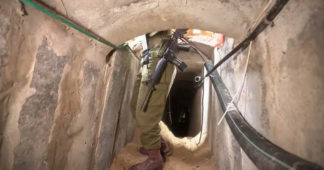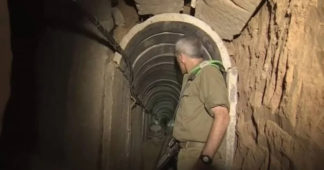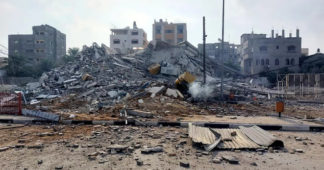By , CNN
December 15, 2023
Seven weeks into Israel’s ground operation in Gaza, one of the key challenges facing the Israeli military is the labyrinth of Hamas tunnels that it says spans the entirety of the Strip.
In an effort to destroy the underground network, Israel has begun flooding some of Gaza’s tunnels with seawater, a US official told CNN on Tuesday, adding that the Israelis are “carefully testing out” the method “on a limited basis.”
If successful, flooding could be ramped up to degrade the tunnel network on a larger scale.
The method, however, is difficult and controversial. Even if implemented with sufficient amounts of water at high enough pressure, it may prove only partially successful. It also risks contaminating freshwater supplies and damaging whatever infrastructure remains on the surface.
For the Israeli government, it also risks killing hostages still held by Hamas in Gaza, many of whom are believed to be underground.
The Israelis are unsure whether the method will work, the American official said, but they assured the US that they are being careful to only test it in tunnels where they do not believe hostages are being held.
CNN has reached out to the Israeli military for comment.
A spokesperson for Hamas on Thursday said the group had built its tunnels to withstand possible attempts to pump water into them.
“The tunnels were built by well-trained and educated engineers who considered all possible attacks from the occupation, including pumping water,” Hamas spokesperson Osama Hamdan told a news conference in the Lebanese capital Beirut.
The tunnels however have also acted as an economic lifeline for Gaza’s residents, transporting people, goods and sometimes even American fast food amid a 17-year blockade imposed by Israel and Egypt.
A tool of warfare
Tunnels have historically been used as a tool of warfare. They were used by the French in the interwar period, by al Qaeda in the mountains of Afghanistan and by the Viet Cong in the jungles of Southeast Asia.
Hamas’ tunnels are unique, however. They are “very innovative in their depth, in their sophistication, in their mining, in their trapping,” said Danny Orbach, a military historian at the Hebrew University of Jerusalem.
The subterranean structure is allegedly built under most of the Gaza Strip – a densely populated territory that is home to more than 2 million people – and by some accounts reaches a couple of hundred feet underground.
Hamas’ tunnels can be large enough to fit adult fighters, weaponry, goods and even cars, according to experts and footage released by the group. Some are reinforced with thick cement walls or are separated by metal doors, and not all of them are connected, experts say.
The scale of the Israeli military’s tests is unclear: how much water and how much pressure it is using to flood the tunnels it or even which tunnels it is targeting.
For the operation to succeed, the pressure with which the water is pumped into the tunnels would have to be high enough to destroy not only the cement walls, but also the thick, metal doors separating some of them.
At the very least, Orbach says, the flooding operation could force Hamas militants to move within the tunnels, which would aid Israeli intelligence in identifying militants and possibly hostages.
Continue reading at edition.cnn.com
Also read
Hersh Reveals How Israel Is Considering Flooding Hamas’s Tunnel System in Gaza
We remind our readers that publication of articles on our site does not mean that we agree with what is written. Our policy is to publish anything which we consider of interest, so as to assist our readers in forming their opinions. Sometimes we even publish articles with which we totally disagree, since we believe it is important for our readers to be informed on as wide a spectrum of views as possible.











